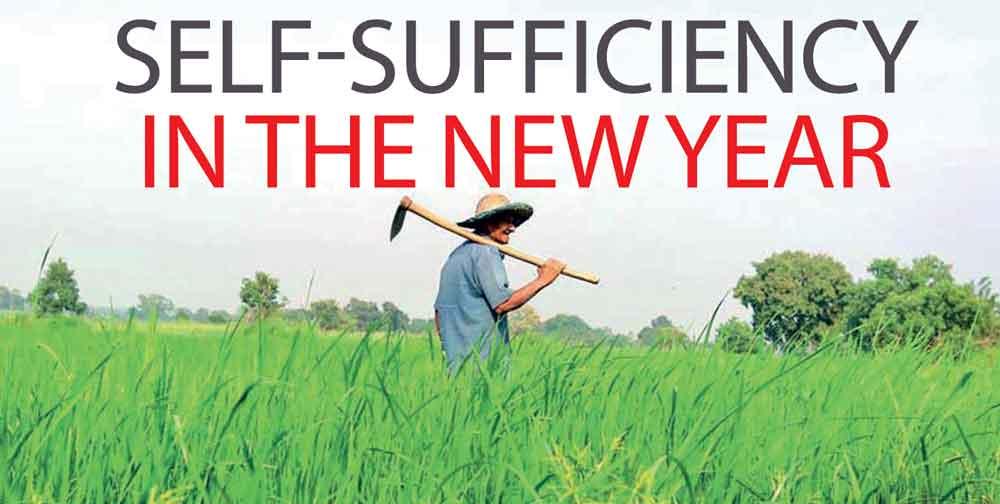Reply To:
Name - Reply Comment

The climate crisis will, most of all, affect food production causing shortages and massive food price fluctuations
The flawed IMF program with its focus on the market has further aggravated the economic situation with a food crisis
 Sri Lanka over the last three years has been hit by tremendous price hikes and shortages of essential services and goods. What does the New Year hold for the working people, pummelled by the rising cost of living and stagnant incomes, whose lives have become unbearable?
Sri Lanka over the last three years has been hit by tremendous price hikes and shortages of essential services and goods. What does the New Year hold for the working people, pummelled by the rising cost of living and stagnant incomes, whose lives have become unbearable?
Even as the public awaits the national budget next month, to address the ongoing economic crisis, the Government should announce a firm New Year resolution to address people’s suffering. I argue that resolution should be self-sufficiency first!
 Vehicle imports
Vehicle imports
Three years ago, with the disruptions of the Covid pandemic and rising global commodity prices triggered by the onset of the war in Ukraine, Sri Lanka faced tremendous shortages of imported goods with the collapse of foreign reserves. The Government of that time, failed to prioritise imports in the preceding years, which could have at least ensured the flow of essential goods. Those shortages were never really resolved. The so-called solution of market pricing imported goods from fuel to cement which only led to the contraction of demand for such goods. Indeed, the consumption of fuel and cement have fallen between thirty and fifty percent reflecting a deep economic depression; a drastic fall in consumption with people travelling less and not repairing or building houses.
Disregarding these dynamics, the wealthier classes are jubilant about the possibility of buying vehicles this year, as the IMF programme problematically calls for the lifting of restrictions on vehicle imports. What do more cars on the road mean when working people cannot even afford public transport?
In fact, the economic crisis itself was in part a consequence of vehicle imports funded by external borrowing. I warned about this trend and the impending disaster in this very column titled “Crisis, Class and Consumption” on 4 October 2021:
“In this context, from 2010 to 2019, Sri Lanka’s vehicle import bill was US$ 8,628 million. And the biggest headache for Sri Lanka today is the US$ 13,000 million in sovereign bonds that have to be repaid over the next many years. Here, the average each year of US$ 863 million in vehicles imports by using foreign exchange from sovereign debt requires debt payment ten years later of US$ 1,500 million each year. Multiply that debt repayment cost over ten years and the unsustainability of the sovereign debt stock becomes clear. Unable to pay for the past luxurious consumption of the elite, the country is now reduced to restricting the imports of essential foods for the people. Would it not be fair to wage a massive wealth tax on the wealthy classes and redistribute such wealth to the working classes so they can survive this crisis?”
The current IMF programme is marching Sri Lanka right back into a similar situation with another cycle of vehicle imports that will lead to the draining of foreign reserves. While those reserves are expected to increase with more commercial borrowing in international capital markets, another shock in the global markets will push Sri Lanka back to where it was four years ago.
Food crisis
The flawed IMF program with its focus on the market has further aggravated the economic situation with a food crisis. It is no longer imported goods alone that is a problem in the country, essential foods produced in Sri Lanka itself including rice, coconuts and salt, are now in shortage. The most economically marginalised of our people during the direst of times who rely on a plate of rice and sambol, or rice porridge, cannot even afford that.
What a dangerous state for our country, where people cannot afford the bare minimum of calories to keep them from starvation, not to mention the unaffordability of nutritious food such as fish and milk. Sadly, the average consumption of fish per person per year has dropped from 31kg in 2015 to 19kg in 2023, amounting to a forty percent drop due to the reduced production for local consumption and unaffordability of seafood. This is in the context where seventy percent of our people’s animal protein depends on seafood.
All this means, the Government needs to get its priorities right. Without food today, there is no point talking about economic prosperity in the future. There needs to be a resolute emphasis on self-sufficiency beginning with food we can produce in the country and extending to other goods.
Public distribution system
Self-sufficiency in food will only be possible if we rebuild our public distribution system that was long abandoned with the open economy reforms in the late 1970s. That means re-investing in many of our institutions such as the Food Commissioner Department, the Co-operative Wholesale Establishment, the Paddy Marketing Board, the Ceylon Fisheries Corporation and the Multi-Purpose Co-operative Societies.
There will be the clamour of neoliberal proponents claiming these institutions are inefficient and have failed. In reality, it was a deliberate move of the political class and the economic elite to make these institutions fail for their extractive interests justified under the guise of a market economy. They never care about the consequences of a food crisis, as long as their supermarkets are stocked with food, even if it meant unaffordable prices for ordinary people.
This year and the year ahead are likely to be full of global shocks. Geopolitical tensions, not to mention the ongoing wars, could escalate further. A global trade war seems imminent as Trump pushes his populist agenda. The climate crisis will, most of all, affect food production causing shortages and massive food price fluctuations.
In such troubling times there needs to be a focus on the food system. That will require the Government to focus on planning, and not the IMF prescribed reliance on markets. There is also the need to revive state institutions relating to the food system and social institutions such as co-operatives that can mobilise people towards food production. Indeed, the New Year resolution for us as a country should be self-sufficiency.